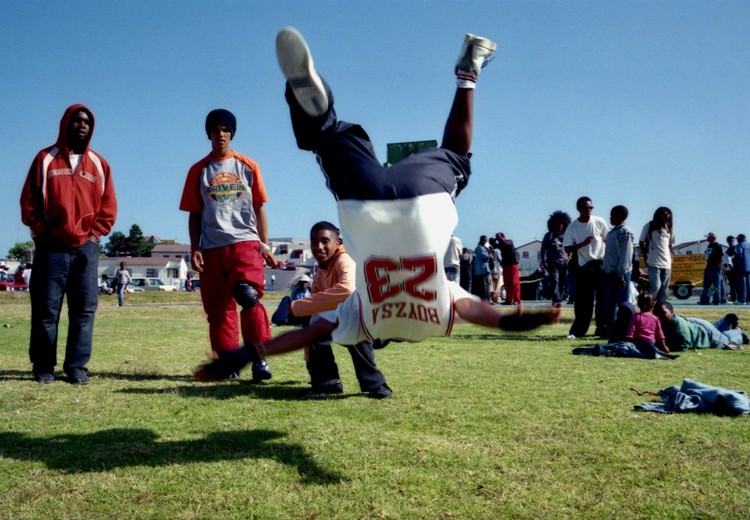
Youth practice hip hop breakdancing outside the Gugulethu community centre. Heal the Hood, which empowers youth through hip hop disciplines, says City events policies are so restrictive that they no longer hold their own events, but work through schools or other organisations. Photo: Steve Kretzmann
31 July 2019
A number of arts and culture organisations have expressed their frustration with the City of Cape Town’s funding procedures and event permit policies. One internationally recognised organisation has given up trying to deal with local government bureaucracy.
Several significant organisations believe the City’s Events By-law is geared for large, well-funded and well-staffed organisations, and fails to acknowledge the challenges faced by smaller initiatives in the arts and culture sector.
Complaints include the cost of public display permits for advertising posters, opaque application procedures for grant-in-aid, and onerous and expensive event permit requirements.
Heal the Hood is a 20-year-old organisation that uses hip hop to develop a sense of self-worth among youth on the Cape Flats. It was awarded hip hop organisation of the year in 2010 by Words Beats and Life Inc, based in Washington DC. Its senior administrator, Shaquile Southgate, says it is easier to obtain international donor funding than support from the City of Cape Town. It has simply given up trying to obtain funding from the City or organise its own events.
Southgate said it seemed the City’s Arts and Culture Department was virtually “non-existent” and City authorities were “not there to encourage the growth of smaller events and organisations”.
“We attended a general public consultation held at the Civic Centre for grant-in-aid funding available for community and non-profit organisations. We were told there was R8 million available.”
The organisation applied for funding last year, but has received no feedback or response. He said their application was sent via their ward councillor in September 2018.
Grassy Park ward councillor Patricia van der Ross said there was no funding from the ward allocation available for Heal the Hood’s application, so she had sent it to the subcouncil. She said she would follow it up.
A big blow for Heal the Hood was also the loss of the use of the Good Hope Centre, which it hired from the City to host the annual African Hip Hop Indaba from 2001 to 2014.
But, said Southgate, since 2014 the City decided to hire it out to filming companies and it was no longer available for events.
He said they lost 80% of attendees when they had to move the indaba to the Grace Performing Arts Centre in Epping in 2015
The City Hall is available for events, but with its seating arrangement and smaller capacity, it did not suit an international hip hop event. Venues such as the Cape Town International Convention Centre are too expensive, starting at about R100,000, as opposed to about R20,000 it paid for the Good Hope Centre, said Southgate.
Since 2016, rather than go through laborious event permit requirements, they have placed the indaba under the banner of the Muizenberg Festival and held it at the Muizenberg High school or the Muizenberg community hall. This year they are partnering with Cape Peninsula University of Technology and plan to host it at the Bellville campus.
The five-day Open Book festival of literature, which hosts its ninth event next month, has also found dealing with the City a frustrating experience.
Festival director Mervyn Sloman says the nub of the issue was that the costs of meeting the City’s requirements for obtaining an event permit amounted to over 25% of the funding received by the City.
Requirements included public liability insurance and an independent financial audit.
The problem was that the City’s Events By-law adopted a one-size-fits-all approach, says Open Streets Cape Town acting managing director Rebecca Campbell.
Open Streets fosters social cohesion by organising car-free days in communities, enabling residents to use the streets for recreational activities.
Campbell was hesitant to level criticism at the City despite admitting being frustrated at the red tape involved in obtaining an event permit.
Open Streets submitted comment on the Events By-law in 2014, stating that while recognising the need for the City to regulate events, there was too much emphasis on regulation and not enough on facilitation, which ran contrary to principles stated in the by-law.
The by-law makes provision for a cumbersome and unclear process which event organisers at most levels find difficult to navigate, submitted Open Streets Cape Town. “Only those with significant financial resources are able to comply fairly easily with the bylaw process … This effectively limits the scope for small organisations or community groups to engage with the formal process and limits potential opportunities for the City to engage with the community.”
Open Streets urged the City to consider distinguishing between community events and commercial events, but these suggestions were not included.
An email sent to events.applications@capetown.gov.za, which is the email listed on the City website, inquiring what is required to organise the hosting of an event, and what costs were involved in receiving a permit, received no response over a period of four days.
In June the City officially launched its events e-permit system which allows permit applications to be submitted electronically. Mayco Member for Safety and Security JP Smith said this was part of the City’s efforts to modernise event bookings and make it easier for event organisers to do business.
“By the end of March 2019, the Events Office had issued 1,047 event permits. The number is likely to exceed the 1,277 permits issued in the previous financial year,” stated Smith, adding that R50 million was budgeted to support these events.
Questions sent to the City regarding the use of the Good Hope Centre could not be answered at the time of publishing.